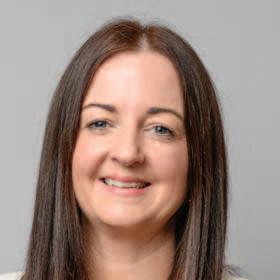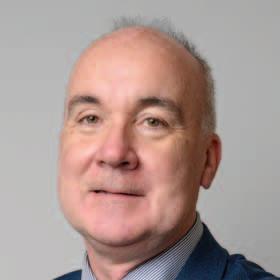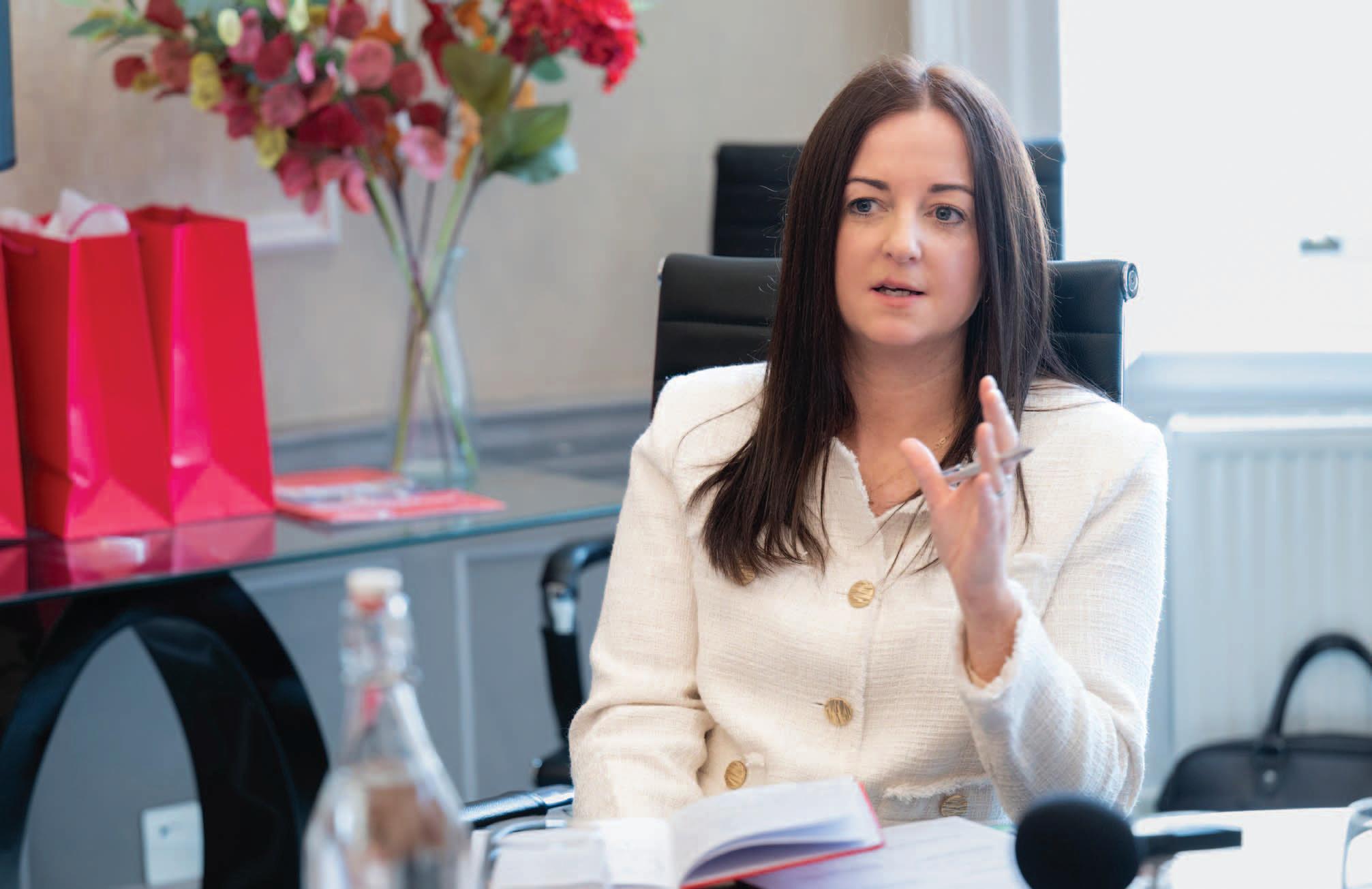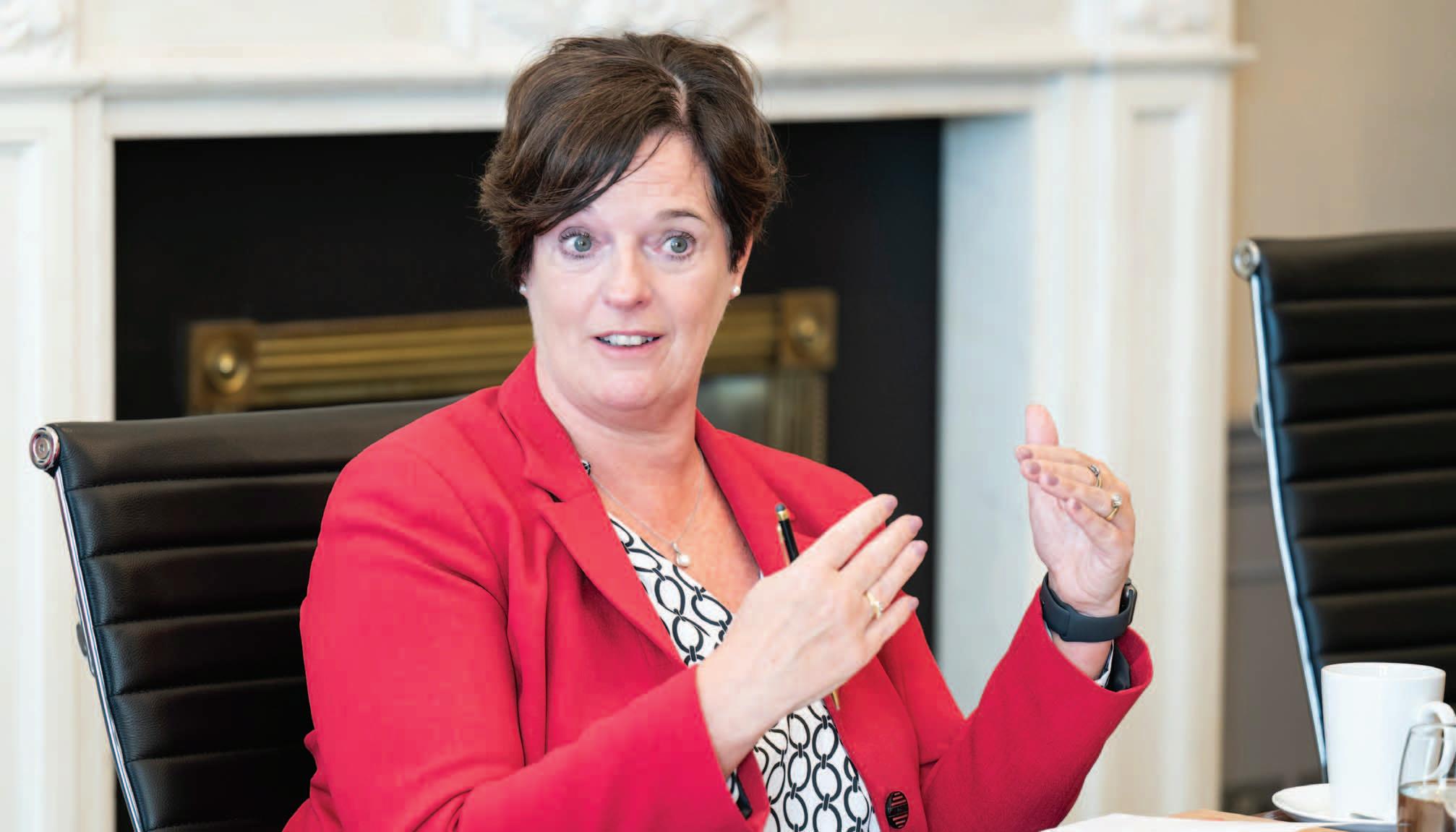The evolution of sustainable tourism in Ireland
Fexco Managed and Advisory Services hosted a round table discussion with key stakeholders across the public, semi-state, and private sectors to discuss the evolution of sustainable tourism in Ireland in the context of ambitious national climate objectives and evolving visitor expectations.
What are the fundamental principles guiding sustainable tourism in an Irish context?
Noel Sheahan
Previously, tourism policy was defined by visitor numbers; getting as many overseas visitors as possible to spend as much money as possible. Now, while overseas revenue is still a key consideration, we must consider in the context of our overall national targets for emissions. That is our starting point. Unlike other sectors such as agriculture or transport, we currently do not have a specific tourism emissions reduction target though it is recognised that
tourism must play its part in delivering the overall reduction targets. The direction of travel for the forthcoming Tourism Policy Framework is guided by three pillars: environmental; economic; and social sustainability.
Jenny De Saulles
A significant focus of the discourse is carbon emissions, but it is also important for us to understand that sustainability, as a concept, is much broader. Consider the UN World Tourism Organization definition. Very clearly, sustainable tourism is that which “takes full account of its current and future economic, social and environmental impacts, addressing the needs of visitors, the industry, the environment and host communities”. We
Round table discussion hosted by
must be cognisant of each of those elements.
Cathal Foley
Economic viability is equally important; ensuring that sustainability initiatives are sustainable across the whole value chain when observed through a business lens. Evidently, there is a growing consumer desire globally with a projected growth in sustainable tourism of up to 200 per cent by 2030. We have a unique position in Ireland to build on our green image. We are not reinventing our offering, rather we are enhancing what we already have. Data is at the core of PACE’s operations. As such, providing an early validation of the impact that sustainable initiatives are having is crucial. It builds momentum and allows people to buy into a process that has proven value beyond marketing alone.
Ailish Hansen
There is one consideration we cannot ignore and that is visitor expectation. Sustainability and climate action are a foremost consideration in each of the
sectors that Fexco has a footprint in. Customers want to interact with businesses or markets that are sustainable and environmentally responsible. Equally, if not more so, this applies to visitors and tourism. As we continue to guide the development of sustainable tourism, we must be cognisant of expectation to ensure the continued success of tourism as one of Ireland’s most significant economic sectors.
Declan Meally
SEAI is observing a significant degree of climate confusion; people not truly understanding what the direction of travel is and where to begin. Signposting energy use as a starting point is key in helping individuals and businesses to begin defining a structure that helps them communicate the impact that they are having. Monitoring and articulating the overall impact that the tourism sector is having and communicating that to a local audience and beyond is the most impactful place to begin.
How can Ireland best balance the economic imperative of tourism against potentially negative social and environmental benefits?
Noel Sheahan
From an economic perspective, tourism must continue to thrive but there is consensus across all relevant stakeholders that from an environmental perspective, ‘business as usual’ is no longer an option. The impetus is no longer confined to having as many tourists as possible, rather it is about concentrating on the best target markets in terms of revenue and in terms of a CO2 emission reduction. This means generating as much revenue as possible with as small a carbon footprint as possible.
Jenny De Saulles
Sustainability needs to be fundamentally built into everything we do. On top of this, we must ensure adequate community engagement. Fáilte Ireland has adopted destination development plans which are all about the impact at community level. Informing all these plans is community representation at the heart of the working group.
Simultaneously, while tourism creates jobs in every corner of the country, we must ensure that these are good jobs. As such, we must engage with employees
Round table participants
Jenny De Saulles
Jenny De Saulles is Director of Sector Development of Fáilte Ireland, the National Tourism Development Authority. In her previous role, Jenny was the Head of Ireland’s Ancient East and has worked with Fáilte Ireland for over 15 years in both national and regional roles working on destination, product, industry, and commercial development. Jenny has extensive fast-moving consumer goods (FMCG) experience, previously working with Nestlé across the globe in a variety of commercial roles as well as in private consultancy.
Cathal Foley
Cathal Foley is CEO of Fexco’s Platform for Analysing Carbon Emissions, PACE, and has almost 20 years of experience in Investment banking and private equity, including equity derivative trading experience with HSBC and BNP Paribas. While in southeast Asia he worked in renewable energy asset and power purchase transactions. Cathal is also Chief Commercial Officer for Fexco’s design and innovation division, DRIVE, and is responsible for Core and New product Innovation across Fexco group.
Ailish Hansen
Ailish Hansen is the Chef Commercial Officer at Fexco Managed Services, bringing over a decade of expertise in partnership development and organisational problem-solving to organisations. With a strong background in business strategy, the focus of Ailish in her role at Fexco is to forge strong partnerships through collaborative engagements aimed at solving complex business challenges as a trusted advisor.
Declan Meally
Declan Meally is Director of Business, Public Sector and Transport and a member of the Executive Leadership Team in the Sustainable Energy Authority of Ireland (SEAI). Declan joined SEAI in 2005 and has served as head of department across several areas at SEAI including industry, marine/ocean energy, smart grid, transport, communities, and more recently national retrofit. He is a chartered mechanical engineer and has worked for over 20 years in management in both the public and private sectors. Prior to joining SEAI, Declan worked in management in Xerox Europe Limited and Aer Rianta International, as well as the Defence Forces.
Noel Sheahan
Noel Sheahan is the Principal Officer with responsibility for tourism policy in the Department of Tourism Culture, Arts, Gaeltacht, Sport and Media. He took up his current role in November 2023 having previously headed up the sports capital division of the Department. Noel is based in the Department’s offices in Killarney, County Kerry.
“A thriving tourism sector can coexist with sustainable tourism practices, but this necessitates change.”
Ailish Hansen
within the sector so that we are cognisant of the needs of workers.
Cathal Foley
Ireland is already a leader in this space and the opportunity before us is to consolidate this leadership position. Data is key to all of this; if we are saying something is sustainable, then we must prove it. If your marketing is defined by sustainability tourism, the consumer will want to see the proof.
Declan Meally
I agree that the key word is data. Data informs the crucial starting point – which can often be the main challenge. The work that SEAI has been doing with businesses and communities has been about helping them to complete their initial baseline study to determine what their carbon footprint is from the outset. This work goes beyond engagement, it is about empowerment. If you have good data, then you can set out a coherent plan which outlines the direction of travel for businesses. This is also the key to being able to demonstrate that the sustainability actions that businesses take go beyond greenwashing and make a real difference.
Ailish Hansen
A thriving tourism sector can coexist with sustainable tourism practices, but this necessitates change. Change in mindsets, change in behaviours, change in investment, and change in supports for the sector. Of course this change comes at a cost. The industry requires affordable funding via green loans and grants so that it is supported on its journey. The sustainability advice and supports available under the Climate Action Plan being implemented and are being received well in the industry.
To what extent can the tourism sector contribute to halving Ireland’s greenhouse gas emissions by 2030 and achieve climate neutrality by 2050?
Declan Meally
In 2022, the SEAI’s National Heat Study outlined that fossil fuels are used excessively across the tourism sector. Following on from the many years of SEAI working with industry, there is now a strong opportunity to manage the reduction of emissions through the proper use of building management systems and getting retrofit projects commissioned. Some of the best-known hotel chains in the country are now
making use of biomass boilers and receiving a 15-year tariff from the State. Equipped with data through the heat study, SEAI is in partnership with Fáilte Ireland and the tourism industry, ensuring we have as many energy champions as possible to support the transition.
Jenny De Saulles
Many businesses are already engaged in their decarbonisation journey, but for others the main challenge is knowing where to start. Through its Climate Action Programme, Fáilte Ireland has provided businesses with independent advice to determine the best, most cost-efficient pathway for them according to their needs. Many tourism businesses are SMEs, so we have partnered with SEAI and Skillnet Ireland to create a one stop shop for the sector, meaning that they have a single programme providing the required direction and clarity to embark on their sustainability journey.
Cathal Foley
In most companies, the person responsible for sustainability often has another job, whether within an SME in the west of Ireland or within a global bank. While this is changing and improving, it points to the same fundamental point; procuring data is the basis for understanding the transition journey in every company. The same steps are needed across all sectors, the only variable relates to the scale required.
“If you are not engaged with the sustainability transition you will not survive as a business.”
Declan Meally
Ailish Hansen
Transport is an obvious area which can contribute to a reduction in the sector’s emissions. When I consider this, there are two other aspects: firstly, how the visitor arrives on the island and secondly, what they do after they arrive at that initial destination. Given that we are an island nation, the focus primarily falls to behaviour. We must look at all aspects of how we promote public transport and make EV infrastructure and vehicles available for example. We also must accelerate the rollout of active travel infrastructure. Within tourism, we must help reduce the number of journeys taken, maximising opportunities at each stage of the journey rather than forcing visitors to continuously travel which thereby increases the emissions footprint throughout the duration of their trip.
Noel Sheahan
The challenge for individual enterprises is often a perception that broadly states: “There is only so much I can do individually; I need direction and guidance.” While tourism businesses can play a part, it must be acknowledged that many factors relating to emissions are outside their direct control. If you look at an individual carbon footprint from someone visiting from overseas, most of it is transport related. Overall, there are some grounds for optimism with the prospect of sustainable aviation fuel
(SAF) and enhanced investment in sustainable transport infrastructure throughout the country.
What initiatives could most effectively encourage shared responsibility among both the industry and visitors to optimise the benefits of sustainable tourism for Ireland’s people
and places?
Ailish Hansen
From an industry perspective, companies want to play their part and enhance sustainability. However, if I am an enterprise, I also want this to drive loyalty and contribute to my economic growth. From a visitor’s perspective, I want my travel choices to be responsible and to take full advantage of more sustainable options, but I also want value for my loyalty. What we need is a coalescing of these interests. One possibility is a digital loyalty programme whereby the businesses are enabled by strong public sector guidance, and customers are satisfied with the level of sustainability of that company’s service. There is mutual reward which encourages responsible decision-making and incentivises companies to take these crucial steps.
Cathal Foley
There is a role for both incentive and regulation in tourism policy. However, trying to purely regulate the pathway to sustainability will merely lead to an increase in costs and not incentivise the conditions for improved sustainability. There is price sensitivity for consumers around sustainability and we cannot have a situation whereby they are shouldering additional cost. Furthermore, both tourist and business sentiment indicate a desire to enhance sustainability. Ultimately, businesses can save money through sustainability initiatives. This is the message that must be popularised.
Noel Sheahan
What we sometimes forget is the other travel options in Ireland – active travel or cycling and walking – which, obviously, are zero emissions alternatives. Whereas in other parts of the world there is a threat of overheating during the summer, that will not be a challenge in Ireland – in the short term at least. As such, Ireland has real opportunities in terms of ‘slow tourism’. Already, we have observed huge improvements with the introduction of greenways and walking trails, not least 4
“A significant focus of the discourse is carbon emissions, but it is also important for us to understand that sustainability, as a concept, is much broader.”
Jenny De Saulles
those associated with the just transition project in the midlands.
Jenny De Saulles
Tourism has a strong opportunity to educate visitors on sustainability and increase their awareness in a positive way. This means providing sustainable experiences in an accessible and wellcommunicated manner. In terms of a carrot and stick approach, there is a good insight to be garnered from the Corporate Sustainability Reporting Directive (CSRD) which catalysed the industry into action. While there was a price to be paid for that initially, now there is a much-improved understanding of what we need for enhanced sustainability. However, for many in the industry, there is no sense of urgency, and a significant cohort is not engaging. We must bring them on that journey by injecting a sense of urgency.
Declan Meally
If you are not at the table, you are on the menu. In other words, if you are not engaged with the sustainability transition
“While overseas revenue is still a key consideration, we must consider in the context of our overall national targets for emissions.” Noel Sheahan
you will not survive as a business. Increasingly, banks will not lend to customers with unsustainable practices while the State cannot sustain its grants in perpetuity. Currently, grants are very effective but one day they will be replaced with regulation whereby companies will be mandated to take these steps or pay the price. Businesses must take this seriously. Overall though, we are getting great traction and the partnerships being formed between SEAI and other stakeholders at this time have enormous potential.
What are the emerging opportunities for Ireland to establish itself as a world leader in sustainable tourism practices while maintaining the delivery of high-quality tourism experiences?
Jenny De Saulles
There is a major opportunity. Consider the visitor’s perception of Ireland; it is regarded as ‘green’ and naturally associated with sustainability. That is a positive starting point. However, it is important that our communications are factual. Research indicates that if consumers engage with a brand that has lied about its sustainable attributes, they will not return. As such, we are working to develop a single all-island sustainability assurance mark. Consumers are confused by the myriad of sustainability credentials which are currently in use. In evaluating existing sustainability accreditation schemes elsewhere, we have determined that all our stakeholders have expressed a willingness to engage with this new initiative. The new certification scheme will empower businesses to credibly communicate their sustainability credentials. This has assumed new significance in the context of the new EU Green Claims Directive.
Ailish Hansen
Ireland is well on track to being a world leader. So the attention should move to how we make that known. If you consider Ireland as a product, it has a unique culture and story that is attractive to consumers – particularly among the diaspora which is a population 10 times greater than that of the island and includes globally influential people. By coupling this story with our sustainability achievements, the effective communication of which will enhance recognition and inform people’s decisions to visit.
“Ultimately, businesses can save money through sustainability initiatives.” Cathal Foley
Declan Meally
Ireland’s unique offering is its community experience. The whole rationale is to embed tourism into communities so that visitors can feel that they are part of the community. SEAI has helped develop over 700 sustainable energy communities which are collaborating to achieve energy goals, for example, in collaboration between local businesses and hotels. That is where we have an ideal opportunity. We already know that we are good at it. How do we make it tangible? Through good data, useful information, and good insights which means that we can tell visitors exactly what their footprint is in terms of transport, electricity, and heat. Again, this can be gamified so that visitors can collect points along the way to be used when they return.
Noel Sheahan
Another advantage that we have is the genuine acceptance and buy-in from the tourism sector that action must be taken. This is a credit to Fáilte Ireland’s ongoing
engagement work. The public consultation on the new Tourism Policy Framework is running until the end of April 2024 and the initial responses indicate a unanimous understanding of the need for change.
Jenny De Saulles
There has been a dramatic change in awareness in the last 12 months. For instance, Fáilte Ireland launched its new Climate Action Programme for the tourism industry in February 2024. Initially, we set a target of 150 large businesses participating across the year, but we achieved that in one month.
Cathal Foley
High quality tourism experiences and sustainability go hand in hand. Ireland is not known for fast tourism. Sustainable tourism is a huge opportunity to create unique experiences and capture demand in what is a growing market.















